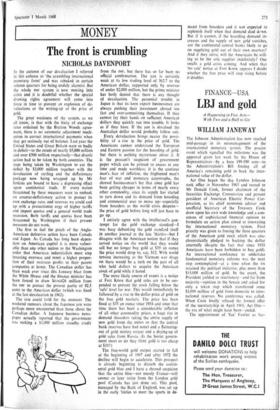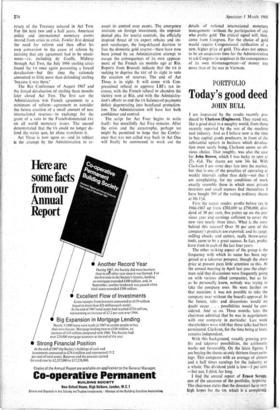LBJ and gold
FINANCE-USA
A Happening in Five Acts— With Two and a Half to Go
WILLIAM JANEWAY
The Johnson Administration has now reached mid-passage in its mismanagement of the international monetary system. The precise event which signalled this milestone was the approval given last week by the House of Representatives—by a bare 199-190 vote—to the Administration's Bill freeing all of America's remaining gold to back the inter- national value of the dollar.
Act One began the day Lyndon Johnson took office in November 1963 and turned to Mr Donald Cook, former chairman of the Securities Exchange Commission and present president of American Electric Power Cor- poration, as his chief economic adviser and unofficial Secretary of the Treasury. Cook drew upon his own wide knowledge and a con- sensus of sophisticated financial opinion to formulate an action plan aimed at renovating the international monetary system. First priority was given to freeing the three quarters of the American gold stock which was ana- chronistically pledged to backing the dollar internally (despite the fact that since 1933 Americans have been forbidden to buy gold). An international conference to undertake fundamental monetary reforms was the next step contemplated—at a time when the us retained the political initiative, plus more than $15,000 million of gold. In the event, the President yielded to reactionary—and far from majority—opinion in the Senate and asked for only a token step which transferred some $3,000 million of gold from domestic to inter- national reserves. No conference was called. When Cook finally refused the formal offer of the secretaryship in April 1965, Act One— the era of what might have been—ended.
The appointment of 'Joe' Fowler as Sec-
retary of the Treasury ushered in Act Two. For the next two and a half years, American policy and international monetary events moved from crisis to crisis. Fowler first denied the need for reform and then offset his own conversion to the cause of reform by insisting that any agreement had to be unani- mous—i.e. including de Gaulle. Midway through Act Two, the July 1966 sterling crisis found ' the us once again preventing a forced devaluation—but this time the rationale amounted to little more than defending sterling `because it was there.'
The Rio Conference of August 1967 and the forced devaluation of sterling three months later closed Act Two. The first saw the Administration win French agreement to a minimum of reform—agreement to consider the future creation of a small amount of new international reserves—in exchange for the grant of a veto to the French-dominated EEC on all world monetary issues. The second demonstrated that the us could no longer de- fend the status quo, let alone transform it.
Act Three is now upon us—and its subject is the attempt by the Administration to re- assert its control over events. The emergency restraint on foreign investment, the unprece- dented plea for tourist controls, the officially inspired threat of us export rebates and im- port surcharges, the long-delayed decision to free the domestic gold reserve—these have now been joined by an Administration attempt to escape the consequences of its own appease- ment of the French six months ago at Rio. Reports from Brussels indicate that the us is seeking to deprive the EEC of its right to veto the creation of reserves. The end of Act Three, is in sight. It will come with Con- gressional refusal to approve LBJ's tax in- crease, with the French refusal to abandon the victory won at Rio, and with the Administra- tion's efforts to end the us balance-of-payments deficit degenerating into barefaced protection- ism. The Administration will have lost both confidence and control.
The script for Act Four begins to write itself : but mercifully Act Five remains. After the crisis and the catastrophe, perhaps we might be permitted to hope that the Confer- ence that was not called way back in Act One will finally be summoned to work out the details of rational international monetary management—without the participation, of any who prefer gold: The critical signal will; then, come from Congress. For the choice of gold would require Congressional ratification of a new, higher price of gold. This does not appear to be an auspicious time for the Administration to ask Congress to acquiesce in the consequences of its own mismanagement—of money any more than of the war in Vietnam.



































 Previous page
Previous page